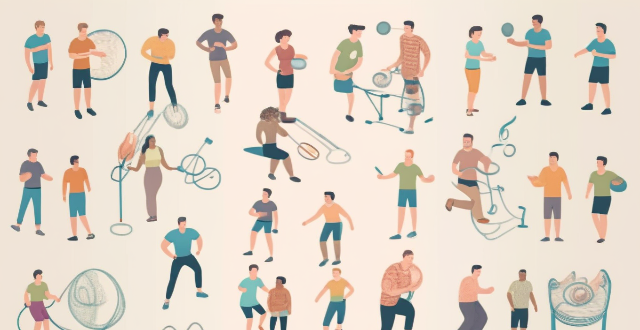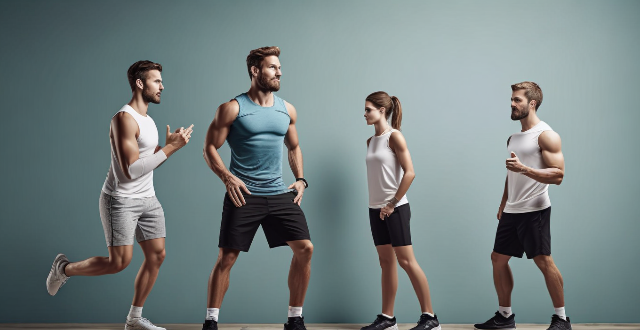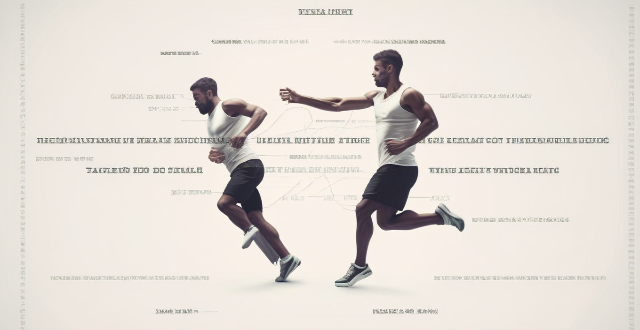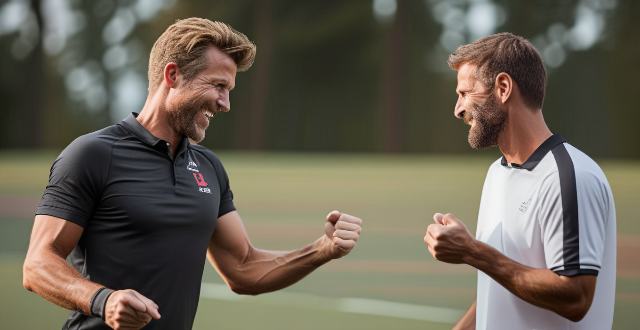Mental Competition

How do athletes cope with the mental stress of competition ?
Athletes employ various strategies to cope with mental stress during competitions, including visualization and imagery, breathing techniques, goal setting, social support, mindfulness and meditation, professional help, and maintaining healthy lifestyle habits. These methods range from mental preparation techniques to seeking professional guidance and engaging in leisure activities for relaxation and enjoyment. By incorporating these strategies into their routines, athletes are better equipped to handle the psychological demands of competition.

How do sports competitions influence stress levels and mental readiness ?
Sports competitions can significantly impact stress levels and mental readiness. Performance pressure, fear of failure, winning obsession, and physical exertion can increase stress levels, while confidence building, goal achievement, camaraderie, and mindfulness practices can decrease them. Similarly, focus and concentration, resilience, mental toughness, and visualization techniques can improve mental readiness, while overthinking, perfectionism, lack of self-belief, and external factors can impair it. Overall, sports competitions provide opportunities for growth, learning, and personal development but also present challenges that require effective coping strategies to manage stress levels and maintain mental readiness.

What role does religion play in athletes' mental preparation for competitions ?
The role of religion in athletes' mental preparation for competitions is significant as it provides motivation, coping mechanisms, resilience, team cohesion, moral guidance, and spiritual fulfillment. Religion can serve as a source of inspiration and help athletes manage stress and anxiety. It also enhances their mental toughness and fosters unity among teammates. Moreover, religion guides athletes in making ethical decisions and offers spiritual fulfillment, contributing to their overall well-being. However, the impact of religion on athletic performance varies depending on individual beliefs and experiences.

How do athletes use music to prepare for competitions ?
Athletes use music in various ways to prepare for competitions, including creating warm-up playlists, listening to calming music for mental preparation, using pump-up songs for emotional momentum, establishing consistent pre-game rituals, and incorporating music into recovery and relaxation routines. The strategic use of music can enhance focus, energy, and overall readiness for competition.

How can athletes manage pre-game nerves and anxiety ?
Pre-game nerves and anxiety are common for athletes but can be managed through various strategies, including mindfulness techniques, physical preparation, mental strategies, support systems, and practice. These methods help athletes perform at their best by transforming nervous energy into focus and drive for success.

How do competitive sports impact mental health ?
Competitive sports have a significant impact on mental health, with both positive and negative effects. Positive effects include increased self-esteem and confidence, improved social skills and teamwork, stress reduction and relaxation, and goal setting and achievement. Negative effects include pressure to perform, fear of injury, burnout and overtraining, and unhealthy weight management practices. It is essential for athletes to manage the pressures associated with competition and prioritize their mental and physical health above all else. Seeking support from coaches, teammates, friends, and family members can also help athletes navigate the challenges of competitive sports and maintain good mental health.

What role should interscholastic competition play in the educational experience ?
Interscholastic competition, including school sports and academic contests, is crucial for students' physical fitness, intellectual growth, and life skills development. It promotes health, skill development, academic achievement, critical thinking, teamwork, leadership, and resilience. Participating in these activities helps students develop transferable skills that are beneficial in various professions and life situations. Schools should continue supporting interscholastic competition as an essential part of the educational experience.

How can mental training improve physical abilities in athletes ?
Mental training is crucial for athletes as it enhances physical abilities by improving focus, managing stress, and promoting a positive mindset. Techniques such as visualization, self-talk, and emotional intelligence contribute to better performance.

What are the best sports careers for someone who loves competition ?
Competitive individuals have various sports career options, including professional athlete, coach/manager, sports analyst/journalist, referee/umpire, personal trainer/fitness instructor, sports agent/manager, and event planner/promoter. Each path offers unique opportunities to thrive on competition and excel in the sporting world.

In what ways do sports movies often misrepresent or glorify athletic competition ?
Sports movies often misrepresent or glorify athletic competition in several ways, including overemphasis on individual achievement, ignoring injuries and pain, glorifying violence, setting unrealistic expectations, and lack of diversity. While sports movies can be entertaining and inspiring, it is important to remember that they often present an idealized version of athletic competition that does not always reflect reality.

What are the benefits of sports for mental health ?
The benefits of sports for mental health are multifaceted and significant, contributing to an individual's overall well-being in numerous ways. The positive impact of physical activity on mental health is well-documented, offering a range of advantages that extend beyond the boundaries of physical fitness. One of the most compelling benefits of engaging in sports is the significant reduction in the risk of depression. Engaging in sports not only aids in combating depression but also helps in reducing anxiety levels. Regular exercise, especially if incorporated as part of a sports routine, can significantly improve sleep patterns. Participating in sports boosts energy levels, making individuals feel more vibrant and alive. Sports provide a platform for individuals to challenge themselves, overcome obstacles, and achieve goals. These experiences can build resilience, an essential trait for maintaining good mental health. Engaging in sports often involves interaction with others, whether as part of a team or through individual competition. This social aspect of sports can provide a sense of community and belonging, which is vital for mental well-being. Through sports participation, individuals can expand their social networks and establish support systems. Having a network of peers who share similar interests and goals can offer emotional and moral support, which is crucial for mental health maintenance. Team sports, in particular, offer opportunities to develop teamwork and communication skills. These skills are transferable to various aspects of life and can enhance interpersonal relationships, contributing to better mental health. Sports provide a structured environment for setting and achieving goals, which can boost self-esteem and a sense of accomplishment. Participating in sports requires discipline and time management, skills that are beneficial both on and off the field. Sports allow individuals to explore their limits and potential, pushing themselves to reach new heights.

How does climate change influence resource competition and its impact on international relations ?
Climate change is significantly impacting resource competition and international relations by altering the availability and distribution of natural resources like water, food, and energy. This results in increased competition among nations for these resources, affecting economic systems, political structures, and global stability. Water scarcity due to changing precipitation patterns is causing conflicts, especially in regions sharing rivers or aquifers. Changes in temperature and rainfall patterns are affecting food production, leading to increased import dependency and potential conflicts over limited resources. Energy resource competition is shifting towards renewables due to climate change impacts on fossil fuels. Countries are engaging in mitigation and adaptation efforts through international agreements, technology transfer, and disaster risk reduction. While climate change presents challenges, it also offers opportunities for global cooperation in addressing this common threat.

How can mental toughness be developed in athletes through sports psychology ?
The article discusses the importance of mental toughness in sports and how sports psychology can help athletes develop this quality. It outlines six ways that sports psychologists can assist athletes in developing mental toughness, including goal setting, self-talk, visualization techniques, stress management, mindfulness practices, and team building activities. These strategies can enhance resilience, focus, and motivation in athletes, leading to success in their chosen sport.

What challenges do sports event organizers face in ensuring fair competition and preventing cheating ?
Organizing a sports event is not an easy task. It requires careful planning, organization, and execution to ensure that the competition is fair and cheating is prevented. Here are some of the challenges that sports event organizers face: 1. Establishing clear rules and regulations that govern the competition. These rules must be fair, comprehensive, and unambiguous to prevent any misunderstanding or misinterpretation. 2. Detecting and preventing cheating, which requires constant vigilance from organizers. Cheating methods evolve with technology, making it challenging for officials to stay up-to-date with the latest techniques and technologies used by cheaters. 3. Maintaining neutrality and impartiality throughout the competition. This involves ensuring no conflicts of interest among officials or judges and preventing bias or discrimination from affecting the outcome of the competition. 4. Managing various logistics and resources required for organizing a sports event. Coordinating schedules for multiple events, participants, officials, and volunteers requires careful planning and coordination. Allocating resources such as venues, equipment, and personnel effectively ensures smooth operation and prevents any delays or disruptions during the event. 5. Addressing unforeseen circumstances that may arise during a sports event. Adverse weather conditions can impact the safety and feasibility of holding an event, requiring contingency plans in place. Medical emergencies can happen at any time during a sports event, so having adequate medical facilities and trained personnel on hand is crucial for dealing with such situations promptly.

What strategies can coaches use to foster resilience and mental toughness in their athletes ?
Strategies for Coaches to Foster Resilience and Mental Toughness in Athletes: Emphasize the Importance of Mindset: Encourage positive self-talk, visualization techniques, and goal setting. Build a Supportive Environment: Create an open communication environment, promote teamwork, and provide constructive feedback. Teach Coping Mechanisms: Introduce stress management techniques, problem-solving skills, and time management strategies. Incorporate Adversity Training: Simulate pressure situations, discuss overcoming setbacks, and incorporate physical challenges. Lead by Example: Model resilience, share personal experiences, and show a commitment to continuous learning.

What role does mental training play in improving sports skills ?
The text discusses the role of mental training in enhancing sports skills. It outlines key points including mental toughness, visualization techniques, goal setting, self-talk, and concentration skills. Mental toughness helps athletes handle pressure, recover from setbacks, and persist through challenges. Visualization techniques can program the subconscious, reduce anxiety, and increase motivation. Goal setting clarifies objectives, tracks progress, and maintains motivation. Positive self-talk boosts confidence, enhances performance, and regulates emotions. Concentration skills block distractions, maintain attention, and improve decision making. The conclusion states that mental training is an essential component of overall athletic success.

What role does discipline in sports play in achieving personal goals and mental resilience ?
The text discusses the importance of discipline in sports for achieving personal goals and building mental resilience. It outlines key aspects such as setting clear objectives, consistent practice, overcoming obstacles, self-regulation, focus and concentration, and resilience under pressure. The article emphasizes that discipline not only enhances physical performance but also strengthens mental fortitude, enabling athletes to reach their full potential and thrive in their respective sports.

How does mental toughness impact athletic performance at a competitive level ?
In summary, this article explores the impact of mental toughness on athletic performance at a competitive level. It highlights the benefits of mental toughness, including enhanced focus and concentration, improved resilience and coping mechanisms, increased confidence and self-belief, and better decision making under pressure. The article also provides practical tips for developing these essential skills through mindfulness techniques, visualization, positive self-talk, scenario training, and continuous self-improvement. Overall, mental toughness is crucial for athletes to perform at their best and achieve success in their chosen sport.

How can sports clubs or teams provide a supportive community for mental health ?
The text discusses the importance of mental health in overall well-being and how sports clubs or teams can play a significant role in providing a supportive community for individuals dealing with mental health challenges. The author lists several ways in which sports clubs can create such an environment, including promoting open communication, creating a safe space, building a sense of belonging, offering opportunities for growth, encouraging physical activity, fostering resilience and coping skills, partnering with professionals, and educating on mental health awareness. The text emphasizes that sports clubs have a unique opportunity to provide a supportive community for mental health by taking these steps and contributing significantly to the overall well-being of their members.

How can educational psychology aid in addressing students' mental health issues ?
Educational psychology can aid in addressing students' mental health issues by understanding the role of emotional intelligence, promoting a positive school climate, providing early intervention and support services, encouraging self-care and resilience, and facilitating collaboration between educators and mental health professionals.

What is the importance of mental health in overall personal well-being ?
The text discusses the importance of mental health in overall personal well-being. It explains how good mental health can lead to better physical health, emotional stability, healthy social relationships, workplace productivity, and an improved quality of life. The article emphasizes the need for prioritizing mental health by seeking professional help when needed, practicing self-care, and engaging in activities that promote good mental health.

How do Paralympic athletes train and compete in their respective sports ?
Paralympic athletes, like their Olympic counterparts, undergo rigorous training regimens to compete at the highest level. However, their training and competition processes often involve unique adaptations due to their disabilities. Paralympic sports have a unique system called "classification" which determines how an athlete's impairment affects their performance in a given sport. Athletes are evaluated and placed into different classes based on their functional ability, ensuring fair competition. Many sports use modified equipment designed to accommodate specific impairments, such as prosthetic limbs for amputee athletes or wheelchairs for those with lower limb disabilities. Rules are often adjusted to account for different abilities, ensuring that all athletes can participate effectively. Paralympic athletes engage in strength, endurance, and skill-specific training tailored to their needs and capabilities. They may work with specialized coaches who understand how to maximize performance despite physical limitations. Athletes might need to adapt techniques used by able-bodied athletes to suit their own bodies and equipment. For instance, a wheelchair basketball player will have a different shooting technique compared to a standing player. Just like any high-level athlete, mental preparation is crucial for Paralympians. They may work with sports psychologists to develop strategies for dealing with competition stress and maintaining focus. Before an event, athletes go through warm-up routines specific to their needs. They also ensure that their equipment is properly adjusted and ready for competition. Athletes compete according to the rules of their sport, with classification taken into account during events. They demonstrate not only physical prowess but also strategic thinking and mental toughness. After competing, athletes cool down and recover just like any other athlete. They review their performance with coaches to identify areas for improvement. Paralympians often face additional challenges related to their disabilities, such as pain management or fatigue. They work closely with medical professionals to manage these issues and maintain peak performance. Venues must be accessible and equipped to handle the specific needs of Paralympic athletes. This includes ramps instead of stairs and adequate space for wheelchair users.

Are there specific exercises that help improve mental health ?
Exercises like yoga, meditation, aerobic exercise, resistance training, MBSR, and Tai Chi can help improve mental health by reducing stress, anxiety, and depression symptoms while promoting relaxation, self-awareness, and social interaction.

In what ways does poor personal hygiene impact mental health ?
Poor personal hygiene can negatively affect mental health by causing decreased self-esteem, social isolation, and exacerbating symptoms of mental health disorders. It is important to maintain good hygiene habits for overall well-being.

How does climate change affect children's mental wellbeing ?
Climate change has a significant impact on children's mental wellbeing, leading to anxiety, fear, emotional distress, grief, and loss. However, by educating children about the issue, providing access to mental health services, and building strong communities, we can help mitigate these effects and support children's overall wellbeing.

What impact has the pandemic had on mental health and well-being ?
The COVID-19 pandemic has significantly impacted mental health and well-being, leading to increased stress, anxiety, depression, insomnia, and substance misuse. Factors such as fear of infection, financial instability, social isolation, grief, and disruption of daily routines contribute to these issues. The situation emphasizes the need for accessible mental health services and support systems to address psychological needs during this challenging period.

How does nutrition impact women's mental health ?
Nutrition has a significant impact on women's mental health. Eating a balanced diet with adequate amounts of vitamins, minerals, and nutrients can help improve mental health. Avoiding processed foods and sugary drinks, drinking enough water, eating breakfast regularly, and getting enough sleep are also essential for good mental health. By taking care of their bodies through nutrition, women can take care of their minds.

Can physical activity improve mental health ?
Physical activity has been found to significantly improve mental health by enhancing self-efficacy and stress self-management skills. Research shows that engaging in physical activities can lead to a sense of accomplishment, boosting an individual's confidence in their abilities, which in turn fosters better stress management and contributes to enhanced mental well-being. This relationship is particularly important for adolescents, a demographic vulnerable to mental health challenges. Future research should focus on identifying specific types of physical activities that have a greater potential to enhance these skills, guiding the development of targeted interventions aimed at improving mental health through physical activity.

How does exercise improve mental health ?
The article discusses how exercise improves mental health by reducing symptoms of depression and anxiety, improving mood, and enhancing cognitive function. It highlights the release of endorphins, regulation of neurotransmitters, stress reduction, increased energy levels, better sleep quality, enhanced self-esteem, improved memory and attention, reduced risk of cognitive decline, and promotion of neuroplasticity as mechanisms through which exercise positively impacts mental well-being. The conclusion emphasizes the importance of regular physical activity for overall well-being and advises consulting a healthcare professional before starting any new exercise program.

How does climate change impact mental health ?
Climate change has a multifaceted impact on mental health, including direct effects such as trauma from extreme weather events and environmental degradation, and indirect effects like economic strain and social disruption. Mitigating this impact involves raising awareness, strengthening community resilience, investing in mental health services, advocating for policies that address both climate change and public health concerns, and encouraging sustainable practices.